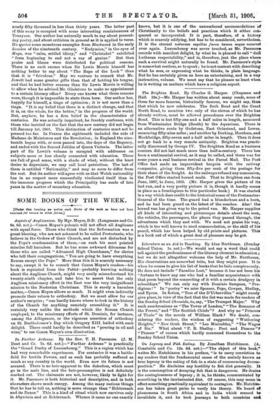THE NEW RAMBLER.
The New Rambler. By Sir Lewis Morris. (Longmans and Co. Cs. 6d. net.)—One naturally turns in looking through a volume of miscellanies to anything that the writer may see fit to say about himself. Let "In the Confessional," therefore, have the first place. It is interesting to hear about the genesis of "The Epic of Hades." Every one will agree that Sir Lewis Morris is here at his best. The subject was an inspiration, and it was worthily treated. It is satisfactory to know that it has been a success in respect of circulation. Few poems have reached a circulation of nearly fifty thousand in less than thirty years. The latter part of this essay is occupied with some interesting reminiscences of Tennyson. Our author has naturally much to say about present- day poetry, and about criticism in general as it is applied to verse. He quotes some monstrous examples from Blackwood in the early decades of the nineteenth century. " Endymion," in the eyes of Maga, was " calm, settled idiocy," and " Christabel" exhibited "from beginning to end not a ray of genius." But then praise and blame were distributed for political reasons. There is no such excuse when Sir Lewis Morris himself has nothing better to say about "The Rape of the Lock" than that it is "frivolous." May we venture to remark that Mr. Jewett had some greater gifts than that of holding his tongue, and that he had better reasons than Sir Lewis Morris is willing to allow when he advised Mr. Gladstone to make no appointment to a certain literary office ? Every one knows what these reasons were, though it is impossible to state them here. Our author has, happily for himself, a tinge of optimism ; it is not more than a tinge. "it is my belief that there is a distinct change, and that it is, on the whole, for the better," in the progress of the world. But, anyhow, he has a firm belief in the characteristics of centuries. He was actually impatient, he frankly confesses, with those who insisted on the fact that the new century did not begin till January 1st, 1901. This distinction of centuries must not be pressed too far. In France the eighteenth included the rule of Madame de Maintenon and the Revolution; in England the nine- teenth began with, or soon passed into, the days of the Regency, and ended with the Second Jubilee of Queen Victoria. The latter part of Sir Lewis's volume is occupied with addresses on subjects more or less closely connected with education. These are full of good sense, with a shade of what, without the least desire to depreciate, we may call local patriotism. The last of them is entitled "Nationality," and may so seem to differ from the rest. But its author will agree with us that Welsh nationality has in no respect more successfully vindicated itself than in the immense progress which the Principality has made of late years in the matter of secondary education.











































 Previous page
Previous page